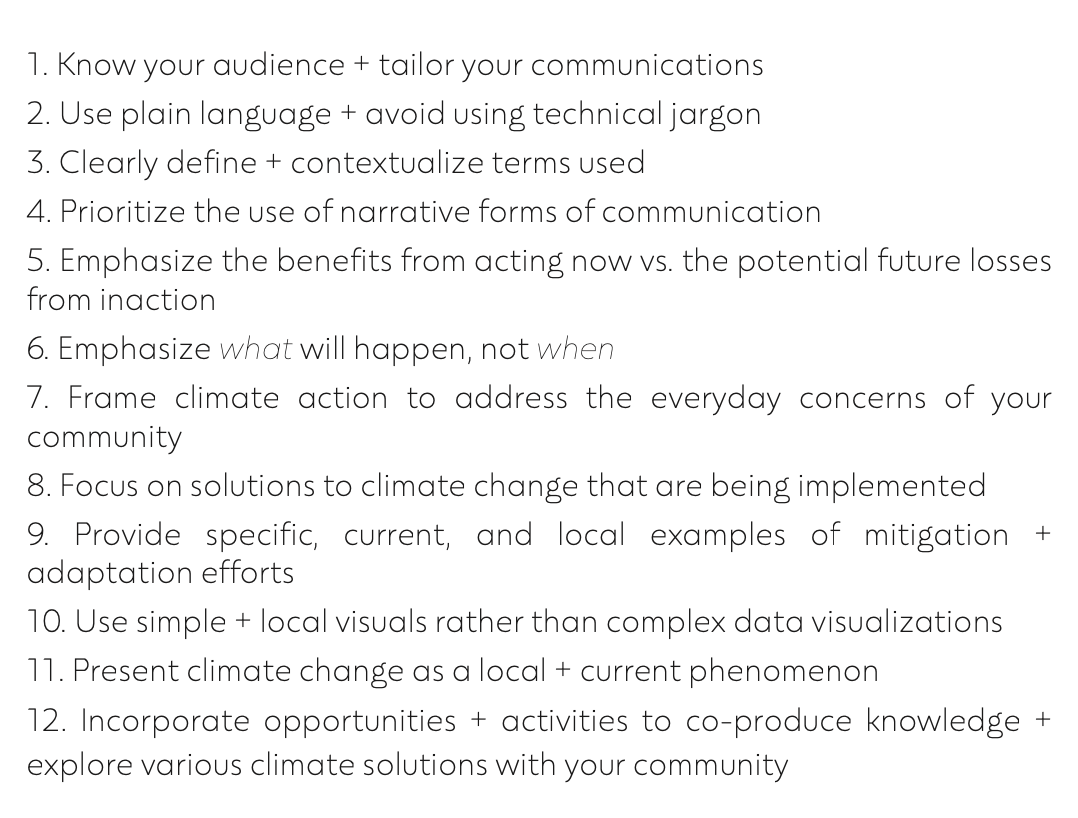Heat Waves and Urban Flooding in Seattle: The Application of a Climate Communication Toolkit for Urban Planners in Puget Sound
Written by: Rachel Chen
Rachel created a “Climate Communication Toolkit for Planners in Puget Sound, WA” as part of her thesis for the Master of Urban Planning program. To incorporate the capstone project for the UW PCC Graduate Certificate in Climate Science, she conducted a focus group to discuss her findings with planners who work throughout Puget Sound and to discuss the climate science behind heat waves and urban flooding in Seattle to demonstrate how to utilize the strategies in her Toolkit.
This capstone project was developed as part of a master’s thesis for the Master of Urban Planning (MUP) program. The thesis, titled “Climate Change Communication Strategies for Urban Planners in Puget Sound, WA,” sought to answer the following research questions: What are the best practices for communicating climate science to non-experts? Which methods are most applicable to community engagement efforts by urban planners in Puget Sound, WA? The thesis informed the creation of a climate change communication toolkit for planners in Puget Sound to use to guide their climate communication efforts with communities. It was based on the current literature on climate communication. The Toolkit was presented in conjunction with an example of how to use the Toolkit in practice for this Graduate Certificate in Climate Science (GCeCS) capstone project. To fulfill the requirements of the GCeCS capstone, a presentation of the Toolkit that included examples of how to use the Toolkit to discuss the climate science of heat waves and urban flooding with community members was created and presented to planners in Puget Sound as part of a focus group. Heat waves and flooding were chosen because they are both climate impacts already affecting cities throughout the Sound and are highly influenced by urban planning.
Though the climate crisis requires immediate action to prevent additional warming, the long-term effectiveness of climate actions could be greatly enhanced by incorporating community expertise and gaining community-wide support. Community engagement in climate planning is crucial to establish a shared knowledge base, increase support for climate action by legitimizing the process, and incorporate local knowledge in climate planning decisions. While there has been plentiful research in recent decades on effective methods of climate communication, there remains a gap in translating these findings into practical advice and recommendations for communication practitioners like urban planners. The corresponding thesis and toolkit attempt to provide some key insights for planners engaged in climate communication, though more work can still be done to this effect.
The capstone project focused on utilizing the strategies identified in my thesis and Toolkit to discuss the climate science of heat waves and urban flooding. The presentation was delivered during a focus group with four planners in Puget Sound and used Seattle as a case study. It avoided using complex graphs or projections like the ones commonly found in climate change communication materials such as IPCC reports. Instead, it included local images to show heat waves and flooding impacts in Seattle, specifically. The data presented to explain the climate mechanisms behind these impacts and projections of the impacts themselves were also localized.

I also utilized other techniques from the toolkit, such as clearly defining terms as I went through my presentation. Overall, these strategies were well-employed in my presentation, as indicated by the survey results, but survey respondents still mentioned some jargon I used throughout the presentation. While I explained the words they listed verbally, including the definition on the slide itself could have further improved the clarity of my presentation and increased its accessibility to all learning styles. As such, including explicit definitions for the science you discuss in your slide deck would be worthwhile. Overall, the PowerPoint reflects recommended strategies such as localizing the adaptation, mitigation, and impacts you are discussing, using plain language, explaining and contextualizing any potentially confusing terms, and emphasizing the benefits of acting now to avoid future costs.
I also utilized a few of the climate visualization tools listed as part of the Toolkit to display local impacts with simple visuals rather than complicated climate projections, namely the Climate Impacts Group’s Climate Mapping for a Resilient Washington tool. Slide 53 of the presentation shows a few examples of climate visualizations that are harder for people to understand. Simplifying your visuals will make for a more effective communication effort. Overall, the discussion of climate impacts was well-received among participants, and the survey results, for the most part, reflect that the presentation effectively relayed the climate science behind these impacts. The survey also allowed the participants to provide feedback on the Toolkit and evaluate my effectiveness as a presenter. While time limited the number of focus groups I could conduct to test the usefulness of these strategies, with more time, I would have conducted a focus group with a community in Seattle to deliver the capstone presentation and complete a pre- and post-survey to assess the effectiveness of the strategies in increasing understanding of climate change among participants.
Hopefully, the presentation can serve as an example of how to tailor your communications to be more effective and relevant to your specific audience using the Toolkit, which provides additional information on these effective strategies as identified in the literature, and an index of some of the climate visualization tools available. Future focus groups with communities could provide additional insight into the effectiveness of these strategies in a planning context.
Rachel Chen is a second-year master of Urban Planning student at the College of Built Environments and completed this capstone project for the Graduate Certificate in Climate Science. Her thesis, integrated with this capstone project, applies effective climate communication strategies to an urban planning community engagement context. She is interested in how climate planning can contribute to equitable and resilient communities. She currently works as a planner at BHC Consultants, assisting with land use planning and building the firm’s climate planning practice.